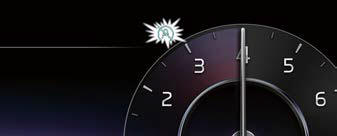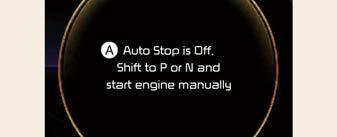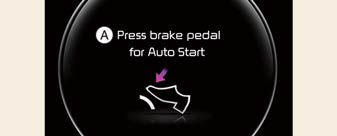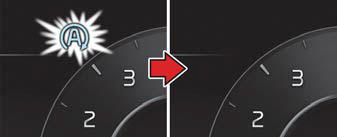Kia Sportage: Auto stop
Idle Stop and Go (ISG) system
The Idle Stop and Go (ISG) system reduces fuel consumption by automatically shutting down the engine when the vehicle is at a standstill. (For example: red light and traffic jam) The engine starts automatically as soon as the starting conditions are met.
The ISG is ON whenever the engine is running.
NOTICE
When the engine automatically starts by the ISG system, some warning lights (ABS, ESC, ESC OFF, EPS or Parking brake warning light) may turn on for a few seconds.
This happens because of low battery voltage. It does not mean the system has malfunctioned.
Auto stop
If you depress the brake pedal and the vehicle comes to a stop with the ISG ON, the engine will stop automatically.
Stop the vehicle completely by pressing
the brake pedal when the gear is in the
D (Drive) or N (Neutral) position.

The engine will stop and the green
AUTO STOP ( ) indicator on the
instrument cluster will appear.
) indicator on the
instrument cluster will appear.
NOTICE
If you open the engine hood in auto stop
mode, the following will happen:

- Auto Stop is Off. Shift to P or N and start engine manually
- The ISG system will deactivate.
- A message will appear on the LCD display.

- Press brake pedal for Auto Start
If you shift the gear from N to D (Manual mode) or R without depressing the brake pedal after stopping engine automatically, the engine does not restart automatically and a warning chime alarms. When this happens, press the brake pedal for auto start.
Auto start
When the engine stops automatically by ISG, the engine will restart if the driver takes one of the following actions:
- Releases the brake pedal.
- Moves the shift gear to the R
(Reverse) position or the Manual
mode while depressing the brake
pedal.

The engine will start and the green
AUTO STOP indicator ( ) on the
instrument cluster will go out.
) on the
instrument cluster will go out.
The engine will also restart automatically without any driver actions if the following occurs:
- The brake vacuum pressure is low.
- The engine has stopped for about 5 minutes.
- The air conditioning is ON with the fan speed set to the highest position.
- The front defroster is ON.
- The battery is weak.
- The cooling and heating performance of the climate control system is unsatisfactory.
- The vehicle is shifted to P (Park) when Auto Hold is activated.
- The door is opened or the seatbelt is unfastened when Auto Hold is activated.
- The EPB switch is pressed when Auto Hold is activated.
READ NEXT:
 Operating conditions
Operating conditions
The ISG will operate under the following
condition:
The driver's seatbelt is fastened.
The driver's door and hood are closed.
The brake vacuum pressure is adequate.
The battery sens
 Smart ISG features
Smart ISG features
Early Engine Restart
If the engine was stopped automatically
by ISG, Early Engine Restart can automatically restart the engine from ISG
without driver action when the vehicle
ahead pulls away and
 Drive mode integrated control system
Drive mode integrated control system
Drive mode
The drive mode may be selected according
to the driver's preference or road
condition.
Type A
Type B
Type C
The Drive mode is activated by turning
the knob.
NOTICE
SEE MORE:
 Rear Glass Defogger Switch
Rear Glass Defogger Switch
Repair procedures
Removal
1. Disconnect the negative (-) battery terminal.
2. Remove the center fascia panel.
(Refer to BE - "Audio")
3. Remove the heater and А/С controller (A) after disconnecting the connector
(B).
NOTE
Take care not to damage the hook when removing the
 Seat belt precautions
Seat belt precautions
Take the following precautions when
using seat belts.
Infant or small child
All 50 states have child restraint laws.
You should be aware of the specific
requirements in your state. Child and/or
infant seats must be properly placed
and installed in the rear seat. For more
information about
Content
- Home
- Kia Sportage - Fifth generation (NQ5) - (2022-2025) - Owner's Manual
- Kia Sportage - Second generation (JEKM) (2005-2015) - Body Workshop Manual
- Kia Sportage Third generation (SL) - (2011-2016) - Service and Repair Manual
- Sitemap
- Top articles